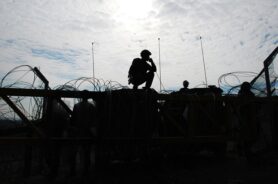Liberal Western democracies are increasingly resorting to remote warfare to govern security threats from a distance. From the 2011 NATO bombings in Libya, the US Africa Command training of Ugandan soldiers to fight Al Shabaab, or the US-led coalition against IS in Syria and Iraq, violence is exercised from afar. Remote warfare is characterised by a shift away from ‘boots on the ground’ deployments towards light-footprint military interventions, and involves a combination of drone strikes and air-strikes, special forces, intelligence operatives, and private contractors, as well as military training teams assisting local forces to do the fighting, killing, and dying on the ground. Violence is thus exercised and facilitated, but without the ‘exposure’ of Western military men and women to opponents in a declared warzone under the condition of mutual risk.
This chapter aims to understand why we see this shift to remote warfare and reviews the moral and political challenges that this new way of war has given rise to. Our key argument is that the secrecy around remote warfare operations, their portrayal as ‘precise’ and ‘surgical’, as well as the asymmetrical distribution of death and suffering they entail, thwarts democratic political deliberation on contemporary warfare. We foresee that it is these qualities of remote warfare that will make Western liberal democracies not less, but more war prone.
This is the remote warfare paradox: the military violence executed is rendered so remote and sanitised, that it becomes uncared for, and even ceases to be the defined as war.
Source:



